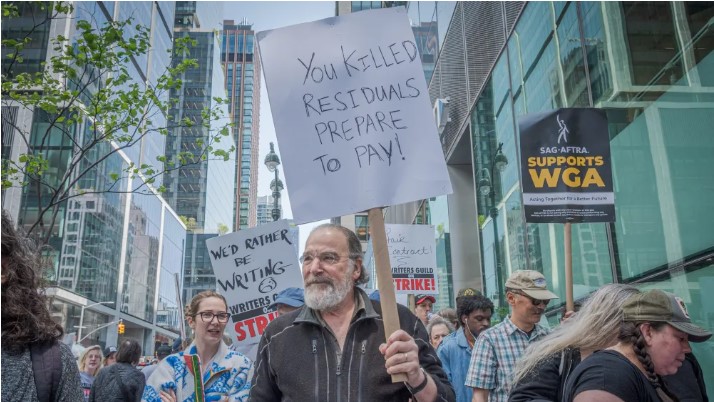From Variety.com
What would it take to get a fair residual in streaming?
That is the question at the heart of both the Writers Guild of America and SAG-AFTRA strikes. It’s also a deep question, with roots in the history of technology and its impact on labor going back nearly a century. Residuals are, now and always, the product of a struggle.
In the simplest terms, they are the payments that artists receive for reuse of their work. Unique to the entertainment industry, they are calculated through obscure and mysterious formulas. When a green envelope arrives in a writer’s mailbox, she often has no idea how many zeros will be on the check.
Residuals are also fiercely defended. In a feast-or-famine industry, they keep artists afloat, and have been the key issue in nearly every strike in Hollywood over the last 71 years. With the transition to streaming, a dramatic overhaul in the entertainment business model, residuals are once again at the center of controversy.
But what are they really?
They are sometimes thought of as a piece of ownership, like a patent or a copyright, establishing a claim on a share of profits. But they are not that. In a collaborative medium, the company holds the copyright.
What they are instead is a deferred minimum payment. They are sent out when a recorded work — a soundtrack, a movie, a TV show — is reused in the same medium or sold to a new medium, regardless of whether that reuse turns a profit.
At root, residuals are about technology. Every advance in the mechanisms of recording or distribution poses a both threat and an opportunity to artists. Residuals are a solvent that allows technology to proceed. Artists capture whatever upside they can find, while the residuals compensate for the threat.
In the 1930s, live radio performers would do a show for the East Coast, and then three hours later another show for the West Coast. Radio networks figured out how to record the first performance and replay it, cutting the performers’ wages in half.
The American Federation of Radio Artists — forerunner of AFTRA, later to merge with the Screen Actors Guild — struck an agreement in 1941 under which performers would be paid their fee for the replay.
In the same era, the American Federation of Musicians, led by James Petrillo, fought especially bitter fights against “canned music.” Radio stations were using phonograph recordings to displace live orchestras, juke boxes were crowding out club performers, and talkies put an end to silent film accompanists. In 1942, Petrillo ordered a full halt to all recording by AFM musicians.
Read full article at: https://variety.com/2023/biz/news/residuals-strike-hollywood-history-wga-sag-aftra-1235727986/


